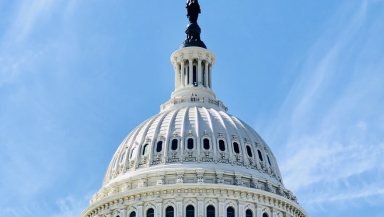
(CP) As a bill that would have codified the right to abortion into federal law failed to advance in the U.S. Senate Monday, pro-life advocates contend that Senate Democrats who supported the bill are "radically out of touch with the American people."
The Senate failed to garner the necessary votes to begin debate on the Women's Health Protection Act, described as a "bill to protect a person's ability to determine whether to continue or end a pregnancy, and to protect a health care provider's ability to provide abortion services."
The Senate came up far short of the 60 votes required to invoke cloture and begin debate on the legislation, with 48 senators voting in favor of cloture and 46 senators voting against it.
All Senate Republicans that voted, including pro-choice Sens. Susan Collins, R-Maine, and Sen. Lisa Murkowski, R-Alaska, voted against invoking cloture.
Sen. Joe Manchin, D-W.Va., was the only Senate Democrat to join Republicans in opposing the bill.
The Women's Health Protection Act passed the Democrat-controlled House of Representatives last year, with all Republicans and one Democrat opposing the measure. The bill was supported by the White House, House Speaker Nancy Pelosi and Senate Majority Leader Chuck Schumer.
Pro-life groups issued statements Monday evening, reiterating their concerns about the legislation and the Democrats' near-unanimous support for it. Meanwhile, pro-abortion organizations have condemned the Senate's failure to advance the bill.
"We thank all our pro-life allies in the Senate who spoke out about the extremism of this bill and helped defeat it," said Marjorie Dannenfelser, president of the grassroots lobbying organization Susan B. Anthony List.
"Biden, Pelosi, and Schumer's 'Abortion on Demand Until Birth Act' would enshrine an unlimited abortion 'right' in federal law and block common ground pro-life laws around the country."
"In calling for this bill to be passed, Chuck Schumer referred to abortion as 'sacred' and a 'fundamental right' — proving that pro-abortion Democrats could not be more radically out of touch with the American people," she added. "Those who sided with the abortion lobby to trample the will of the people will face political consequences."
Carol Tobias, the president of National Right to Life, described the Women's Health Protection Act as evidence of "the abortion zealotry of the Democratic Party."
"This legislation shows just how rigid and uncompromising the Democratic Party has become on abortion," she said.
"This legislation would have made sweeping changes, including expanding taxpayer funding of abortion, and eliminating requirements that a woman be given information about the development of her unborn child so she can make an informed decision."
"This legislation would quash nearly all existing protective state laws," warned Jennifer Popik, NRLC's director of Federal Legislation.
"With this bill, elective abortion would have become the procedure that must always be facilitated — never delayed, never impeded to the slightest degree."
Leaders of pro-abortion advocacy organizations vowed to keep fighting to pass the legislation. Alexis McGill Johnson, president and CEO of Planned Parenthood Federation of America, tweeted Monday asserting that Monday's outcome was "disappointing."
"But the progress we made along the way is still a big step towards protecting abortion access," Johnson tweeted.
"We are grateful for all the organizers, volunteers, supporters, & elected officials who fought for WHPA! We won't stop fighting."
NARAL, a pro-abortion advocacy group, blamed Senate Republicans for blocking the bill's advancement. NARAL contends that the legislation "would safeguard the legal right to abortion."
"Reproductive freedom is at risk — but they failed to protect us," NARAL tweeted. "We're holding the Republicans who voted against WHPA accountable in 2022."
The effort to pass the Women's Health Protection Act, which began nearly three years ago in the 116th U.S. Congress, heated up last fall after the U.S. Supreme Court allowed a Texas law banning abortions after six weeks gestation to go into effect.
Additionally, concerns that the Supreme Court will reverse or weaken the precedent set by Roe v. Wade, the 1973 Supreme Court decision that legalized abortion nationwide, played a role in the push to codify abortion into federal law.
The Supreme Court is scheduled to decide on the constitutionality of a Mississippi law that bans abortion after 15 weeks gestation.
Polling indicates that while most Americans oppose the overturning of Roe, most Americans support limiting abortions after 15 weeks gestation. A poll conducted late last year and sponsored by Harvard University's Center for American Political Studies found that 54% of Americans oppose overturning Roe, while 56% of respondents expressed support for limiting abortions to the first 15 weeks of pregnancy.













